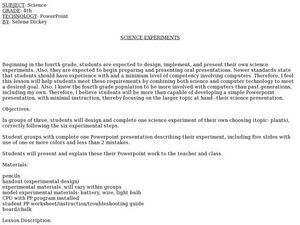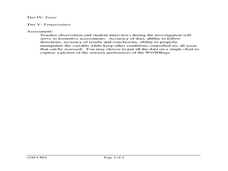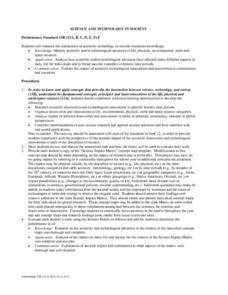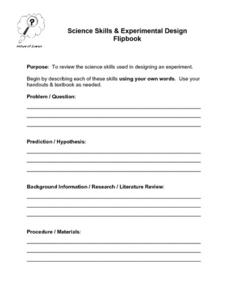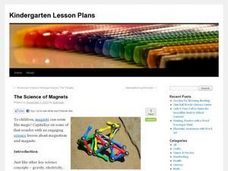Curated OER
Lesson Plan Outline for Rainbow Science
Young scientists study light reflection and refraction as they determine the critical angle, the rainbow angle, and color separation in rainbows. Teams record the data they collect in a shared spreadsheet and discuss results with the class.
Virginia Department of Education
Formulas and Percent Compositions of Ionic Compounds
Try not to blind anyone with science by following the safety rules. The lesson encourages scholars to form an ionic compound from magnesium and chlorine. Then they determine the empirical formula and determine the mole ratio and percent...
Curated OER
Doing Science Safely
Learners are introduced to how to practice science experiments safely outside of school. In groups, they create a poster showing the safety guidelines and responses to specific situations should they occur. They also practice using...
Curated OER
Science Trail
Students explore the solar system by conducting Earth science experiments. In this Sun lesson, students identify the different seasons on Earth and discuss their purpose and cause. Students create a sundial and observe the changes to...
Curated OER
Science Experiments
Fourth graders work together in groups to design and complete one science experiment of their choice. Following the experimental steps, they show their experiment and the results to the class in the form of a PowerPoint. They explain...
Curated OER
The Nature of Science and Technology
Second graders perform a variety of experiments to observe, form conclusions, and make inferences. In this experiment lesson, 2nd graders experiment based on the result of a pre-assessment. Students share what they have learned.
Curated OER
Experimenting With Motion
In this motion worksheet, students design an experiment to investigate motion. They form a question, they develop a hypothesis, they design an experiment and then answer 4 questions about their experiment.
Curated OER
Designing a Germination Experiment - Part 1
Learners experiment with seeds and germination. In this natural science lesson, students discuss the stages of germination. Learners engage in a 4 part hands on science activity to view the process of germination.
Curated OER
Greenhouse Effect: Pop Bottle Experiment
Students explore global warming by conducting a weather experiment. In this greenhouse gas lesson, students define the greenhouse effect and the impact on our ozone layer. Students utilize a soda pop bottle, floodlight bulb, thermometers...
Curated OER
Tsunami Simulation Experiment
Students examine the importance of tsunami warning systems. They read and discuss an article, conduct an experiment in a wave tank, calculate wave velocities of tsunamis, and identify what happens to tsunamis as they approach a shoreline.
Curated OER
SCIENCE AND TECHNOLOGY IN SOCIETY
Students research scientific discoveries and technological innovations. They organize discoveries and innovations in life, environmental, physical, earth and space science categories. They analyze impact of selected discoveries and...
Curated OER
Hurricanes 1: The Science Of Hurricanes
Students are introduced to the science of hurricanes in an effort to highlight how forces change the speed and direction of motion. They list facts about hurricanes; including insights about the formation, movement, and impact hurricanes...
Curated OER
Science in Focus: Force and Motion
Young scholars explore force and motion through a series of experiments. In this physics lesson, students create and interpret speed graphs. They build an electromagnet and explain the factors affecting its strength.
Curated OER
Sunny Science - Sun Up, Fade Out
Learners create bleached designs with the sun's bright light. In this early childhood science lesson, students use their observation and prediction skills as they explore the sun's bleaching power.
Curated OER
Science Skills and Experimental Design
In this experimental design worksheet, students describe the different science skills required when designing an experiment. Then students create a flipbook with the information. This worksheet has 9 short answer questions.
Curated OER
The Science of Magnets
Students are introduced to the concept of magnetism and investigate the properties of magnets. In this magnetism lesson, students identify a magnet then examine why certain things are attracted to magnets and some things are repelled by...
Curated OER
Observation Science
In this making observations in science worksheet, students experiment with whole milk in a pie tin with added food color. They make observations and then add a toothpick with soap on the end to the middle of the tin. They make...
Virginia Department of Education
A Crystal Lab
Young chemists grow ionic crystals, metallic crystals, and supersaturated crystals in three different lab experiments. Observing these under a microscope allows pupils to compare the various structures.
Virginia Department of Education
Matter and Energy: Equations and Formulas
Using simple materials, an informative instructional activity demonstrates the Law of Conservation of Matter and explains how to balance chemical equations. Young chemists perform experiments, analyze reactions, and balance...
Virginia Department of Education
Mystery Iron Ions
Young chemists perform an experiment to determine if a compound is iron (II) chloride or iron (III) chloride. Then they determine the formula, balance the equation, and answer analysis questions.
Virginia Department of Education
The Rate of a Chemical Reaction
If your pupils think a catalyst is a list of their cats, then this might be the lesson for you! Young chemists study the effect of temperature, catalysts, concentration, and particle size on reaction rates during four different...
Virginia Department of Education
Prokaryotes
Lead your biology class on a cell-sized adventure! Emerging scientists construct models of prokaryotes, then design an experiment to properly grow a bacterial culture. They conclude the activity by viewing the culture under a microscope....
Space Awareness
Fizzy Balloons - C02 in School
Carbon dioxide is a very important gas; it is present in the air, used in cooking, and supports plant and animal life. Scholars investigate the properties of carbon dioxide with three different activities. They experience a color change,...
Baylor College
Do Plants Need Light?
Turn your classroom into a greenhouse with a lesson on plant growth. First, investigate the different parts of seeds, identifying the seed coat, cotyledon, and embryo. Then plant the seeds and watch them grow! Measure the new plants...
Other popular searches
- Gravity Science Experiment
- Life Science Experiments
- Designing a Science Experiment
- Egg Science Experiments
- Density Science Experiment
- Hands on Science Experiments
- Space Science Experiments
- Food Science Experiments
- 5 Minute Science Experiments
- Simple Science Experiments
- Air Science Experiments
- Fun Science Experiments




